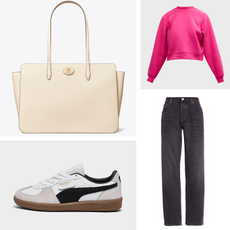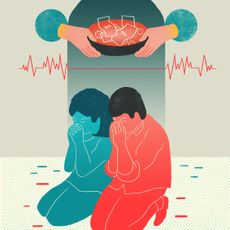

Both Kate Moss (in the December 2012 issue of Vanity Fair) and the Dowager Countess of Grantham (on season five of Downton Abbey) have said "Never complain, never explain," which, in any other case, would be more than enough reason to quit both immediately.
But as much as I believe in the life-advice-giving abilities of supermodels and fictional aristocrats who have a bon mot for every time a family member gets caught fraternizing with the help, I believe in science more. (My AP Chem score does not reflect the previous statement, but I feel this strongly.)
Here, we take a look at the cold, hard facts to inform our final decision next time the age-old question arises: Do I b*tch about it or keep it to myself? The findings may surprise you.
It can help you make friends
How many times have you been queuing somewhere and the girl in front of you turns around like "Ughhhhhhh, isn't this taking forever? It's definitely taking forever."
"There's no doubt in my mind that complaining can serve some very beneficial functions," said Robin Kowalski, a Clemson University psychology professor, in New York Magazine. "For one, it's a great icebreaker." Same goes with the friends you already have—you're lying if you say you don't spend at least some catching-up time venting about all your *other* friends/mutual acquaintances.
It can be more enjoyable to some people than actually enjoying things
In a well-known 1989 study, psychologists Mihaly Csikszentmihalyi and Judith LeFevre found that, even though people at work often wished they were somewhere else, like Dismaland, they reported feeling calmer in their offices than elsewhere. The scientists called this "the paradox of work": "Many people are happier complaining about jobs than they are luxuriating in too much leisure."
It provides emotional relief
Please do not take this as permission to post more Facebook rants (unless they're funny). Venting, especially writing, does help you reach catharsis, an assertion James Pennebaker, a social psychologist at the University of Texas, made after he conducted research involving survivors of traumatic events. By putting their feelings down on paper, his subjects experienced improvements in their mental and physical well-being. Conversely, suppressing thoughts and feelings is associated with long-term stress and health problems.
Stay In The Know
Marie Claire email subscribers get intel on fashion and beauty trends, hot-off-the-press celebrity news, and more. Sign up here.
It might mean you have high self-esteem
Most likely because you're confident that you speaking up = you getting what you want.
It makes you sad
This Facebook-centric study introduces an ouroburos of bad vibes. Negative people are more likely to make negative statements on social media. Wah-wah FB posts don't get likes, lowering the poster's self-esteem even further. Weeping and teeth-gnashing all around.
You get dumber
Trevor Blake, entrepreneur and author of Three Simple Steps: A Map to Success in Business and Life, presents this data in his book. Supposedly, exposure to 30 minutes or more of negativity—including watching Donald Trump on TV—actually peels away neurons in the brain's hippocampus. "That's the part of your brain you need for problem solving," Blake says. "Basically, it turns your brain to mush." Personally, I need to keep all the brain mass I can, thankyouvmuch.
But you could live longer!
Science says curmudgeons live longer, healthier lives than Pollyannas probably because they're more risk-averse and have lower expectations, so pretty much anything going even remotely well comes as a pleasant surprise. Also, given the above, their crotchety-ness might have gotten them a bunch of crotchety friends to do crotchety activities with, which we all know contributes to a nice, strong heart.
So that's what it comes down to: living to a ripe old age surrounded by a bunch of buddies but minus a few IQ points or living to a not-as-ripe old age with that one time Shannon treated you unfairly in second grade still bottled up inside. I think the choice is clear.

Chelsea Peng is a writer and editor who was formerly the assistant editor at MarieClaire.com. She's also worked for The Strategist and Refinery29, and is a graduate of Northwestern University. On her tombstone, she would like a GIF of herself that's better than the one that already exists on the Internet and a free fro-yo machine. Besides frozen dairy products, she's into pirates, carbs, Balzac, and snacking so hard she has to go lie down.
-
 Why Clues Suggest 'Dead Boy Detectives' Will Return for Season 2
Why Clues Suggest 'Dead Boy Detectives' Will Return for Season 2Netflix's 'Sandman' spin-off sets up a grand new adventure for the teen ghost detectives.
By Quinci LeGardye Published
-
 18 Spring Travel Essentials I'm Scooping Up for My European Vacation
18 Spring Travel Essentials I'm Scooping Up for My European VacationSunglasses, sneakers, and sundresses.
By Brooke Knappenberger Published
-
 Amid Dire Reports About His Health, the Palace Issues a Wide-Ranging Update on King Charles
Amid Dire Reports About His Health, the Palace Issues a Wide-Ranging Update on King CharlesThe news was accompanied by a never-before-seen photo of the King and Queen Camilla, taken the day after their 19th wedding anniversary this month.
By Rachel Burchfield Published
-
 Where Did All My Work Friends Go?
Where Did All My Work Friends Go?The pandemic has forced our work friendships to evolve. Will they ever be the same?
By Rachel Epstein Published
-
 So You Want a Postnup
So You Want a PostnupNo, they’re not planning to divorce, yet more couples are facing the awkwardness of getting their marital finances in order—after they say “I do.”
By Emma Pattee Published
-
 The Two Moms Who Took a Year Off to Travel—Then COVID-19 Happened
The Two Moms Who Took a Year Off to Travel—Then COVID-19 HappenedEvery other Thursday, a couple will get candid with Marie Claire about how they split their finances. This week, we're talking to a couple who decided to travel full-time just before COVID-19.
By Marie Claire Published
-
 Warning Working Moms: Your Partner Is Your Glass Ceiling
Warning Working Moms: Your Partner Is Your Glass CeilingBestselling author and essayist Caitlin Moran warns in her new book More Than a Woman that a mother’s career is only as good as the man or woman she marries.
By Jo Piazza Published
-
 The Unemployed Couple Squatting in Their Brooklyn Apartment
The Unemployed Couple Squatting in Their Brooklyn ApartmentEvery other Thursday, a couple will get candid with Marie Claire about how they split their finances. This week, we're talking to a couple who haven't paid rent on their apartment in months.
By Marie Claire Published
-
 The Blogger Couple Who Made $20,000 When the Pandemic Hit
The Blogger Couple Who Made $20,000 When the Pandemic HitEvery month, a couple will get candid with Marie Claire about how they split their finances. This week, we're talking to a couple who lost revenue during the pandemic, but invested wisely.
By Marie Claire Published
-
 The Couple Who Used a Health-Share Ministry for a $1,000,000 Surgery
The Couple Who Used a Health-Share Ministry for a $1,000,000 SurgeryThe latest edition of Marie Claire's Couples + Money series.
By Marie Claire Published
-
 The $266k Couple Whose Wife Created an App to Track Their Spending
The $266k Couple Whose Wife Created an App to Track Their SpendingThe couple make $266,000 a year.
By Marie Claire Published